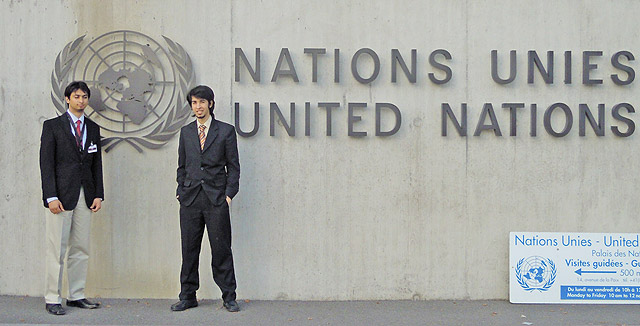Chaudhry ’12, Akbar ’12 Attend Model United Nations Conference

Ali Chaudhry ’12 and Kumail Akbar ’12 participated in the Geneva International Model United Nations (GIMUN) conference March 12-18. Chaudhry and Akbar currently serve as co-presidents for the Wesleyan Model United Nations Society.
The conference took place at the “Palais des Nations,” the United Nations Office at Geneva (previously the Headquarters of the League of Nations). Meetings were held in rooms used by United Nation committees with journalists and interpreters in attendance. The students dined in the UN cafeteria.
“It felt like we were living the life of a diplomat,” Chaudhry says. “We were walking around conducting negotiations and overseeing resolution writing, while having lunch with real diplomats.”
Chaudhry served as the chairperson of the Historical Security Council and Akbar served as the secretary of the Security Council respectively.
Although there is a no-awards policy at GIMUN, Chaudhry received praise and recognition from the secretariat, organizing team and delegates for performing both tasks of a chairperson and secretary. Chaudhry led a committee that simulated the Kashmir dispute in 1948. Eventually, they passed six resolutions, but during the committee they came to realize the difficulty in solving complex issues.
“It’s often easy to blame the UN for its inaction but that blame can only be justified if we can prove that we would act differently if we were in the same shoes as diplomats at that time were,” Chaudhry says. “As we came to realize it, we weren’t able to act very differently because of the complexities involved and the contradictory accounts presented by all parties.”
Since July 2007, the GIMUN stands in “Special Consultative Status with the ECOSOC” and apart from being the only model United Nation in the world to hold this status, the GIMUN is also one of very few UN-accredited NGOs which are run entirely by students. The group represents about 500 committed young people from all over the world that share an interest in the promotion of the idea of the United Nations. The NGO-status enables the GIMUN-members to access all United Nations buildings in the world and to participate in the sessions of different United Nations bodies.
Chaudhry and Akbar found the diversity at the conference mind-boggling.
“Delegates and staff members were from dozens of different countries,” he recalls. “It was great to hear different perspectives both inside and outside committees on world issues. Delegates were active and wanted to solve problems.”

